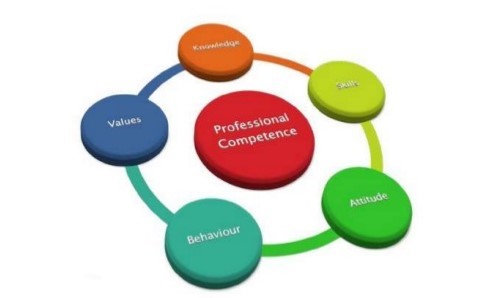Professionalism

Defining Professionalism
The word professional is used by different people in different ways. It is used as an adjective to describe a certain kind of behavior that is usually meant to be calm, controlled, objective and not interested in personal gain.
When used as a noun, it is meant to signify an individual who has, through a combination of education and experience, attained a certain trusted and respected status in society. Within a legal context, professionals are a carefully defined group of individuals to whom specific and important responsibilities and roles have been allocated.
Concepts of professionalism are familiar to us all, yet they are often individualized and vocation specific. To embody the concept of professionalism, the individual interprets and translates the characteristics of the profession into patterns of action that are ethically defensible. The capacity to engage in purposeful deliberation forms the building blocks to the foundation of professionalism is an essential antecedent to every trainer.
Professionalism in training entails ongoing professional development. Lifelong learning is a necessary commitment for any discipline of teaching. Accomplished trainer/facilitator is a status that is continually evolving. It is not a static endpoint, but one meant to inspire continual development. To achieve an accomplished trainer degree, ongoing professional development is a necessity to form the foundation and frame the rich mosaic of knowledge, skills, disposition, and beliefs.
Professionalism can be defined as the skills, competence, and conduct displayed by an individual of a certain profession. It is also expected that such a trainer cultivates a polite demeanor when dealing with participants. Professionalism encompasses a variety of dimensions. It is not only polite behavior or else academic competence; on the contrary, it is a mixture of many qualities that contribute to professionalism. A professional needs to have specialized knowledge in his particular field. This is one of the main characteristics of a true professional. If the individual has gaps in his knowledge, the contribution, that he can make, is minimal.

Characteristics of professionalism
First and foremost, professionals are known for their specialized knowledge. They’ve made a deep personal commitment to develop and improve their skills, and, where appropriate, they have the degrees and certifications that serve as the foundation of this knowledge. Professionals get the job done. They’re reliable, and they keep their promises. If circumstances arise that prevent them from delivering on their promises, they manage expectations upfront, and they do their best to make the situation right. Professionals don’t make excuses but focus on finding solutions.
Being a professional in your chosen field means much more than wearing a coat and tie or possessing a college degree and a noted title. Professionalism also has to do with how you conduct yourself during your training.
Honesty and Integrity
Professionals exhibit qualities such as honesty and integrity. They keep their word, and they can be trusted implicitly because of this. They never compromise their values and will do the right thing, even when it means taking a harder road. More than this, true professionals are humble – if a project or job falls outside their scope of expertise, they’re not afraid to admit it. They immediately ask for help when they need it, and they’re willing to learn from others.
Accountability
Professionals hold themselves accountable for their thoughts, words, and actions, especially when they’ve made a mistake. This personal accountability is closely tied to honesty and integrity, and it’s a vital element of professionalism.
Self-Regulation
They also stay professional under pressure.
For instance, imagine a customer service employee who’s faced with an irate customer. Instead of getting upset or angry in return, the employee exhibits true professionalism by maintaining a calm, businesslike demeanor, and by doing everything that she can to make the situation right.
Genuine professionals show respect for the people around them, no matter what their role or situation. They exhibit a high degree of emotional intelligence (EI) by considering the emotions and needs of others, and they don’t let a bad day impact how they interact with colleagues or clients.
Confident, Not Cocky
Your demeanor should exude confidence but not cockiness. Be polite and well-spoken whether you’re interacting with participants, superiors or co-workers. You need to keep your calm, even during tense situations. Your body language and facial expressions communicate volumes, so be sure they are conveying the message you want others to hear.
Do What You Say You Will Do
As a professional, you will be counted on to find a way to get the job done. Responding to people promptly and following through on promises on time is also important, as this demonstrates reliability. Start the training on time, start meetings on time and follow through on all your commitments.
Be an Expert in Your Field
Professionals strive to become experts in their field, which sets them apart from the rest of the group. This can mean continuing your education by taking courses, attending seminars and attaining any related professional designations. A broad set of skills, from mastering software to clearing jams from the copying machine, adds to the sense that you’re an indispensable member of the team.
Maintain Your Poise
A professional must maintain his poise even when facing a difficult situation. For example, if a colleague or participant treats you in a belligerent manner, you should not resort to the same type of behavior.
Be Structured and Organized
A professional can quickly and easily find what is needed. Your work area should be neat and organized. Take only what you need, be prepared for what is needed for your training and presentation. Few things say “unprofessional” as quickly as a hopelessly cluttered, messy work area.
Own Up to Mistakes
Professionals are accountable for their actions at all times. If you make a mistake, own up to it and try to fix it if possible. Don’t try to place the blame on a colleague. If your group/organization made the mistake, take responsibility and work to resolve the issue.
How to Exhibit Professionalism
As you can see from these characteristics, professionals are the kind of people that others respect and value. They are a genuine credit to their organizations!
This is why it’s so important that we work to earn a professional reputation in the workplace/training. True professionals are the first to be considered for promotions, they are awarded valuable projects or clients, and they are routinely successful in their careers.
Now that you have a clear view of what constitutes professionalism, are you demonstrating these characteristics to the people around you? You’re likely already showing some of them, but you may find yourself lacking in others. To build your own professionalism, focus on improving each of these characteristics. (Focus on one at a time, so you don’t get overwhelmed.)
Additionally, here are some further strategies that will help you to be more professional in the workplace/training:
Build Expertise
Don’t let your knowledge and skills get outdated. Commit to build expertise and stay up-to-date with your area of knowledge.
Honor Your Commitments
Whenever you make a promise to your boss, colleagues or participants, keep it. If it looks as if you won’t be able to meet a deadline, let your boss, team or participants know as soon as sensibly possible. However, do what you can to avoid ending up in this situation!
Don’t make excuses – instead, focus on meeting expectations as best you can, and on making the situation right.
Be Polite
Be kind and polite and use good manners to everyone you come into contact with, no matter what their role is, and no matter how you’re feeling. This might sound unimportant, but it makes a significant impact.
Have the Tools You Need
Do you show up at a meeting/training lacking important samples? Do you arrive at a meeting/training, only to realize that you left a vital file at home? Or, do you find yourself operating in situations where you don’t have the skills you need to do a good job?
True professionals are always prepared. This requires planning, timeliness, and attention. Focus on improving your time management and planning skills, so that you’re always in control.
Note:
Although professionalism means keeping commitments, doing high-quality work, and having expert status, occasionally the pursuit of these attributes might tempt you not to volunteer for projects that fall outside your “comfort zone.”
However, this doesn’t necessarily mean that you shouldn’t try it! Analyze risks beforehand to minimize the consequences of getting things wrong, be honest about any skills gaps that you have, and work to fill them. Then do the best that you possibly can!
Why Professionalism is important
Professionalism is important because it can lead to better standards and higher own success and also can help to create better relationships with co-trainers and participants. Professionalism is important to have at any level of the ladder of achievement.
People who exhibit professionalism at any level have higher rates of success and contentment in their careers. They are able to have longer-lasting relationships with co-trainers and participants and other bodies related to the organization they are representing and have greater relationships with them. Professionalism is not simply focused around dressing for the position of having the right degree, it is in the way a person acts when he or she is around others who are present in the workplace.
Professionalism is important for people who wish to advance their careers. Most professional people maintain a professional attitude whether they are at home or work. They can uphold the standards and morals of their professionalism in all facets of their life. A professional will not only be interested in their own success, but also in the success of others with whom they are working. They will be interested in uplifting co-trainers and advancing the organization they are representing while working to do everything they can to help the participants.
Why did I choose this tool?
Professionalism is an extremely important feature in any work environment. Acting professionally at the workplace makes others think of you as reliable, respectful, and competent. This is especially important when working with private and public institutions and in the context of advocacy and lobbying. Professionalism is required to help first to us, as trainers to build our confidence and opportunity to show our reliability, punctuality, respect, knowledge, and presentation of the topic.
Other Ways to Practice
The trainer maintains a professional demeanor in the training environment, including maintaining standards for dressing, adhering to pre-set time frames for the training, and being well organized and fully prepared for the training.
The trainer demonstrates understanding, and incorporates into practice, the values, ethics, and standards of the professions and the practice/ fields in which trainees work; and can address and reinforce these in all training activities.
The trainer shapes the standards for adult learning and professional development, including respect for trainees; supporting trainees’ self- determination; and maintaining appropriate confidentiality, privacy, and self-disclosure.
The trainer knows the core philosophy and values that underlie the trainees’ field(s) of practice (i.e. regulation, program or center administration, child welfare, adult services, public human services, special education, child psychology, etc.); and can integrate this information throughout the training.
The trainer can articulate the concepts of best practice in the fields of early childhood education and family services and knows the unique role and responsibility of the trainees’ programs, agency(ies) and staff.
The trainer knows the “best practice” standards that apply to the field of practice and competency area s/he trains.
The trainer fully understands the liabilities of attempting to train in competency areas in which the trainer lacks sufficient knowledge, skill, and/or first-hand experience.
The trainer understands the importance of keeping current on laws, state mandates, and practice changes in the fields/related fields of early childhood education and family services, and can incorporate up-to-date information into training curricula.
The trainer knows the laws regarding copyright and plagiarism and knows how to fully and accurately cite sources for materials used in the curriculum.
Reflection questions:
Why is professionalism important for trainings?
What are the qualities of professinalism?
Why ethics is important to professionalism?
What is professionalism in training?
Exercises
5 Steps for Teaching Professionalism in High School
- Start with Practice Interviews.
- Assign Lessons on Professionalism.
- Include an Activity on Professional Dress.
- Have participants Finish the Professionalism Lessons.
- End with a Final Group Project.
Learn more: https://www.aeseducation.com/blog/5-steps-teaching-professionalism-high-school





